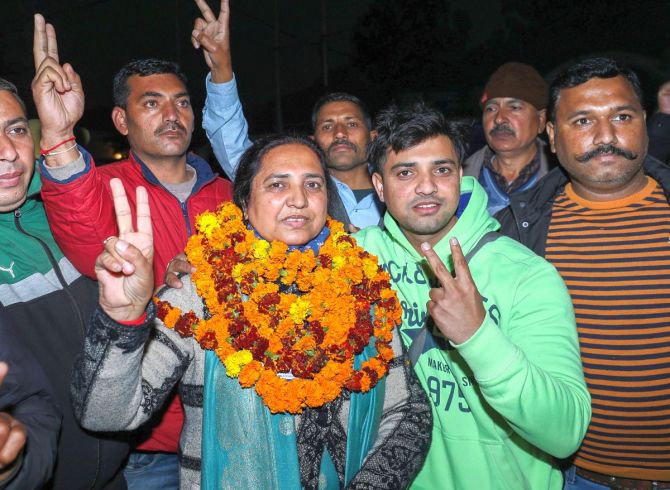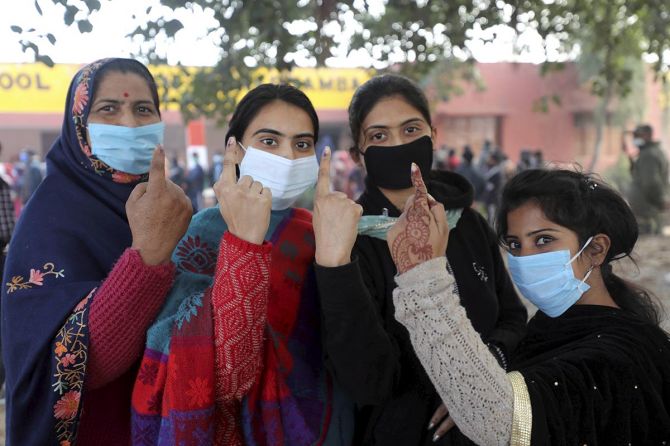 | « Back to article | Print this article |
Women will have a decisive say as chairpersons in seven of Jammu and Kashmir's 20 districts, observes David Devadas.

There is a laudable and somewhat ironic twist to the election of chairpersons of the newly elected district development boards across Jammu and Kashmir: Half of the ten district chairs in the Kashmir Valley are reserved for women.
Two of the ten district chairs in the Jammu division have also been reserved for women, and four (two each) for scheduled castes and scheduled tribes.
In all then, five district chairs on each side of the Pir Panjal are open, for the Reasi chair is doubly reserved, for a scheduled tribe woman.
Scheduled caste reservations apply to only Hindus, and so both the district chairs reserved for scheduled castes are near Jammu, in Udhampur and Samba.
BJP's Kashmiri woman victor
This distribution of women's reservations willy-nilly promotes the empowerment of women in the Valley, giving them lead roles in development.
That has been a talking point of the BJP and its backers.
There is an outside chance that the BJP might get one of the chairs reserved for women.
One of the three persons to have won on BJP tickets from the Kashmir valley is Minha Latif, who won the Kakapora seat, which is reserved for women.
Kakapora has been a hotbed of militancy over the past decade, and has been home to several prominent militants, including the one who attacked a CRPF convoy at Lethpora in February 2019.
No wonder Kakapora was one of the three constituencies in Pulwama district where less than a thousand votes were polled.
Since the Pulwama DDC chair is reserved for a woman, the choice is limited to Latif, two PDP women winners, and two Independent women winners.
If she stands, her party would no doubt go the extra mile to procure support for Latif, who is studying to be a lawyer.
The Peoples Democratic Party, which won seven of the 14 Pulwama seats, ought to have comfortably taken the chair with the support of two National Conference members, but the ongoing negotiations of certain movers and shakers aims to unsettle that calculation.
That Waheed-ur-Rehman Para, the most politically astute of the PDP's seven winners from Pulwama, is in jail on a terror-related charge could make a huge difference.
Sikh concentration in Tral
The Tral constituency, also in Pulwama district, had a substantial turnout, since the leading contenders were Sikhs.
Even more than Kakapora, Tral has become known as a home of militancy since several prominent militants, including the slain Hizbul Mujahideen commander Burhan Wani, hailed from there. But it is also home to a large number of Sikhs.
Indeed, Tral's Sikhs are perhaps more closely knit with their neighbours of other faiths than the Sikhs of Martand in Anantnag, Sangri in Baramulla, or Jawahar Nagar in Srinagar. These are some of the main concentrations of Sikhs in the Kashmir Valley, though there are also clusters of Sikh families as far afield as Karnah.

Late announcement
The fact that the list of reserved chairpersons posts was published a few days after the election results were announced on December 22 has led to speculation that the final decision on which chairs to reserve could have been influenced by which candidates had won in each district.
There is talk, for instance, of some powerful elements wanting to have the wife of a notable leader of the erstwhile state installed in one of the districts that has been reserved for a woman chairperson.
Stated objective
The inclusion of scheduled castes and tribes, women, and other sometimes marginalised sections of society was one of the stated objectives of the Constitutional changes through which the state lost its special status and became two Union territories in August 2019.
If indeed substantial development funds are channelled through the new DDCs, women will have a decisive say as chairpersons in seven of Jammu and Kashmir's 20 districts.
Many of the women who have been elected sarpanch in the past have acted on the advice of their husbands.
However, some of the women elected to DDCs are daughters of politicians, and so have grown up around intense political activity -- two in Anantnag district, for instance.
Anantnag is one of the five Valley districts reserved for a woman chair.
Indeed, all three districts of the Valley which contain a city -- Srinagar, Baramulla, and Anantnag -- have been reserved for women chairpersons.
The top posts in Pulwama and Kulgam, both of which have been severely affected by terrorism in recent years, have also been reserved for women.
The Kulgam chair could possibly go to Ruby Jan, the only woman among the five elected in that district from the CPI-M, or to one of the four women elected from the National Conference -- which also won five seats in Kulgam.
The PDP and the Congress won two seats each, and would be expected to vote for either a CPI-M or National Conference candidate.
Anti-Discrimination agenda
Discrimination with regard to the inheritance rights of the children of women who married outside the state was one of the issues that had been taken up by those who pressed for the removal of special status for Jammu and Kashmir. (Rules for inheritance had been drawn up to prioritise patriarchal lineage.)
Its backers had also cited discriminatory rules regarding the employment of those categorised as scheduled castes.
If employed by the government, they were limited to demeaning traditional caste-based occupations.
Feature Presentation: Aslam Hunani/Rediff.com